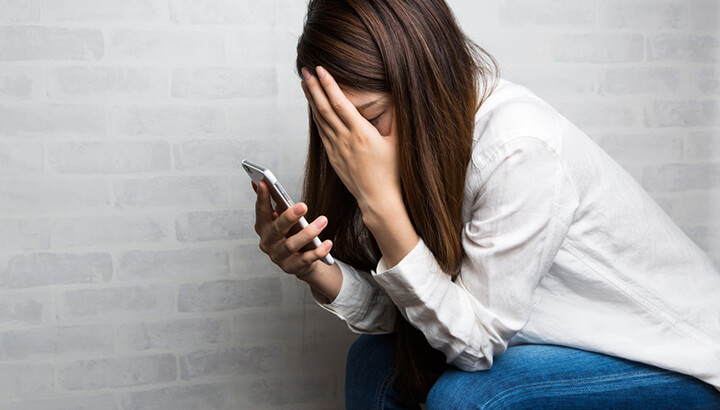
If you’ve ever experienced a panic attack, then you know that it can feel like the end of the world, or at least the end of your world as you know it. While most panic attacks only last a few moments, these moments can stretch to infinity when you’re in the thick of it. Sometimes it feels like your heart might stop. Sometimes it feels like you can’t breathe and you’re going to hyperventilate into unconsciousness. Or sometimes it feels like you’re sick and there’s nothing you can do about it.
As a person with lifelong anxiety struggles, I’ve experienced many panic attacks. Millions of people the world over share this burden, as well. Panic attacks are not only frightening, they’re extremely frustrating. They seem to occur when they are least expected. One minute everything is fine, and then, often with no external stimulus or warning, it seems like the planet is spinning out of control.
When it comes to dealing with panic attacks, different methods work for different people. I’d like to share six things that have helped me get through mine. Sometimes, one thing will work wonders. Other times, a combination is the key. While it may not always be possible to stop a panic attack, with practice, you can gain more control and make it much smoother for yourself.
Embrace mindfulness
Mindfulness, the cornerstone behind the extremely beneficial practice of meditation, is all about staying aware of the ever-moving present. When a panic attack comes on, the first thing to do is to be aware of it and accept what is happening. You may be tempted to pretend it’s not happening or try to talk yourself out of the panic. However, this can just lead to you feeling even more panicked.
Instead, try to take a mental step back. Accept that the panic is coming and observe how it feels in the present. Don’t fight it. When we are in a state of fear, the mind tends to swirl to the future or obsess about implications of the past. If you keep yourself present, it takes away the power that these thoughts have over you, even though they may still occur.
For some people, sitting down and actually meditating when they feel a panic attack coming on may work. For others, it’s impossible to sit. If this is the case with you, move around. Don’t make yourself sit still against your will, but try to keep your mind as centered on the present, and meditative, as possible.
Pay attention to your breathing

With a panic attack comes shortness of breath or the feeling that you’re not getting enough air. Try taking long, slow breaths and even holding your breath for a few seconds before releasing. However, watch out for getting too involved in breath control during a panic attack. I’ve done this before, and the harder I tried to control my breath, the more constrained it felt. If deep breathing isn’t working, it’s best to focus on something else and let your breath happen naturally.
Change your scenery
Sometimes, a change of scenery can help a ton. During past panic attacks, I’ve felt highly claustrophobic in the room I was in — the room itself became kind of an echo chamber of the panic. Getting out of the place where the panic begins, at least for a while, may help.
If you’re inside and the weather isn’t catastrophic, go outside. Take a walk, if you can, and observe the sights around you. If you can’t go outside, at least move to another room. If the lights are on, try turning them off, turning on a night light or lighting some candles. If it is dark, try making the room as bright as possible. This alone can help reset your brain a bit.
Engage in something creative
When in the midst of a panic attack, the best thing you can do is immerse yourself in an activity you love, preferably one where you are actively creating something. This turns your energies to something you can see coming together. If you like art, draw, paint or sculpt something. If you’re into music, now’s a good time to pick up an instrument or sing at the top of your lungs.
If you like to write, grab a journal or open up a blank document on your computer and just write whatever comes to mind. Don’t think about what you’re going to write, just write it. Don’t worry about grammar or making sense, just get the words out. This is one of my favorite strategies; I find it extremely focusing and soothing.
When the panic attack has passed, look at what you’ve drawn, written or composed. You may surprise yourself.
Do something physical
Exercise is a great way to flood your brain with endorphins and wear out that churning fear energy that a panic attack creates. Go for a run, a brisk walk, a swim — anything physical that you like to do. If you’re stuck inside, do some jumping jacks in your living room. Or dance! This gets bonus points because it’s creative and physical at the same time. Turn up your favorite music and start moving.
Occupy your mind
If you’re panicking in a way that you can’t bring yourself to do something creative, and don’t want to go and move around, at least find something to do to occupy your mind. Playing a video game, doing a puzzle or even playing with some Legos can help to focus your mind away from your panic. If your hands are shaking and this isn’t working for you, turn on your favorite upbeat, positive movie — one that makes you smile.
Call a friend

If you have a close friend that you can vent to, give them a call. If this friend is also prone to panic, make sure that you listen next time they call you. A panic attack “buddy system” is an invaluable thing. You can help make each other laugh through the panic. You can help each other release the fears you are having and calm down from the anxiety.
Write a letter
If you don’t happen to know someone you can vent to in this way, no worries. You can write a letter! Address it to whoever you want or address it to yourself. Journal how you are feeling and everything you want to say. Use illustrations if you want. This can not only help you to feel better during a panic attack, it can also serve as a useful tool once you’re not panicking anymore. It may give you insight on fears you are having so that you can develop strategies to address them.
I truly hope that helps! One more thing: to help prevent future panic attacks, try making both meditation and exercise regular habits. Both of these activities can help to center your mind and make you feel present so that things don’t build up to the point of panic.
– Tanya Mead

